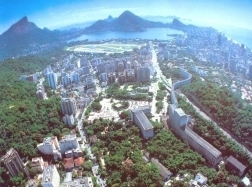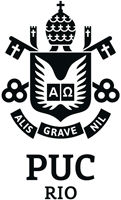Graduate Program

PUC-Rio graduate course in Economics is the embodiment of our excellent faculty members and students, and their outstanding work. Thesis (Master’s Program), dissertations (PhD Program) and academic papers written by members of this Department are often published in the most prestigious international journals. These papers receive recurrent accolades and awards in Brazilian academia.
The full-time teaching staff within the Department is composed of PhD professors who graduated at the top teaching and research centers in the world (Cambridge University, Harvard University, Massachusetts Institute of Technology, New York University, Princeton University, Stanford University, University of California at Berkeley and University of Chicago). Some professors are PUC-Rio graduates.
By bringing together a group of capable and motivated professors and students, in an environment conducive to exchanging ideas and developing research, the result can be none other than a high-level academic education. Over the past years, professors from PUC-Rio Department of Economics have published their work in the five most prestigious international journals in the field (American Economic Review, Econometrica, Quarterly Journal of Economics, Journal of Political Economy and Review of Economic Studies), as well as in other renowned ones (Economic Journal, Journal of Applied Econometrics, Journal of Development Economics, Journal of Econometrics, Journal of Finance, Journal of International Economics, Journal of Public Economics, Review of Economics and Statistics etc.).
Dissertations (Master’s Program) and theses (PhD Program) written by our students have the same standard of excellence. BNDES Economics Award selects the best dissertations, and one third of the dissertations awarded between 1983 and 2009, were given to students from PUC. In recent years, our graduate students have also received several awards: ANPEC’s Haralambos Simeonidis Award, ANBID Capital Markets Award, FEBRABAN Banking Award and SEFAZ-SEDEIS Public Finance and Economic Development Award, amongst others. Articles were also published in leading journals overseas (Economía – The Journal of LACEA, Economic Development and Cultural Change, Economic Theory, Health Economics, Journal of Econometrics, Journal of Economic History, Journal of Mathematical Economics, Review of Economics and Statistics, Review of Economic Studies etc.).
Curriculum
The graduate program is geared towards providing rigorous technical education and intense research experience, so that our students can fully acquire an academic background which is a pre-requisite to a solid education, be it one of a future researcher or in the labor market.
On average, it takes two years and three months to complete the Master’s Program. The course covers all the main aspects of macroeconomics, microeconomics and econometrics. In addition to this, the course provides students with the opportunity to get involved with subjects that interest them, and also fosters the opportunity for our students to begin academic research.
The table below summarizes the framework of the Master’s Program
|
Year |
Period |
Modules/Activities |
|
1st |
Summer |
Mathematics |
|
1st Semester |
Econometrics I |
|
|
2nd Semester |
Macroeconomics II |
|
|
2nd |
Summer |
Summer article |
|
1st Semester |
Dissertation Seminar I |
|
|
2nd Semester |
Dissertation Seminar II |
|
|
3rd |
Summer |
Thesis defense |
In January and February of the first year of the Master’s Program, students take leveling courses in Mathematics and Statistics that cover the basics to enable them to understand course material that will be taught further on in the course. During the first and second semesters of the first year, students are exposed to the most up-to-date theories in Econometrics, Macroeconomics and Microeconomics, which today constitute the basis of research in Economics. In the second semester of the first year, they also begin to choose their elective modules. In the second year of the Master’s Program, students finish their course related work, and begin to focus on their thesis. As part of this process, during the summer of their second year, they write a short article exploring potential research topics. They begin to effectively work on their dissertation in the first semester, and in the second semester, they present preliminary results at weekly Departmental workshops. The Master’s Program thesis defense normally takes place in March of the third year.
From the second semester of the first year onwards, the elective modules offered are Macroeconomics II, Econometrics II and all of the subject fields offered by the Department. The fields which have recurrently been offered include: Economic Development, Econometrics, Public Sector Economics, Labor Economics, Finance, Economic History, Macroeconomics, Industrial Organization and Economic Theory. Usually, two courses are offered on an annual basis in each one of these areas.
The Department of Economics at PUC-Rio enables students from the Master’s Program to transition directly to a PhD Program. Subject to a satisfactory academic record, and the Departments’ own criteria, these transitions may occur without defending the Master’s thesis, at the end of the second or third year of the Program.
On average it takes four years and three months to complete the PhD Program. The course covers all the central aspects of Macro and Microeconomic theory and also Econometrics theory and practice. In addition to this, students study two PhD fields that focus on active research areas of the Department which are typically associated to dissertation topics chosen by the students. The structure and quality level of the PhD Program are equivalent to high-level programs offered abroad.
The table below summarizes the framework of the PhD Program
Year
|
Period |
Modules/Activities |
|
|
1st |
Summer |
Mathematics |
|
1st Semester |
Econometrics I |
|
|
2nd Semester |
Econometrics II |
|
|
2nd |
Summer |
Qualification exams |
|
1st Semester |
Economic History |
|
|
2nd Semester |
2 elective modules |
|
|
3rd |
Summer or end of the 1st Semester |
Field examination |
|
1st Semester |
Dissertation Seminar I |
|
|
2nd Semester |
Dissertation Seminar II |
|
|
1st Semester |
Dissertation Seminar III |
|
|
2nd Semester |
IV Dissertation Seminar IV |
|
|
5th |
Summer |
Dissertation defense |
In January and February of the first year of the PhD Program, the students take leveling courses in Mathematics and Statistics that cover the basics to enable them to understand course material that will be taught further on in the course. During the first and second semesters of the first year, students are exposed to the most up-to-date theories in Econometrics, Macroeconomics and Microeconomics, which today constitute the basis of research in Economics (compulsory courses). In the second year of their PhD Program, students take a class in Economic History and classes related to their principal and secondary fields (two courses for each field). In addition to this, at the end of the first year, PhD students take qualification exams in Macroeconomics and Microeconomics, and at the end of the second year, they take the field examination related to their main field of study.
As of the third year of the PhD Program, it is expected that students be able to commit exclusively to their dissertation. As part of this process, in the third and fourth years of the program, students present preliminary results of their work at weekly Departmental workshops. PhD dissertation defense normally takes place in March of the fifth year.
Concentration fields recurrently offered by the graduate program in recent years have been as follows: Economic Development, Econometrics, Economics of the Public Sector, Labor Economics, Finance, Economic History, Macroeconomics, Industrial Organization and Economics Theory. The main field should be comprised of two courses in one of these areas. The secondary field on the other hand, may be comprised of two courses in correlated areas.
For students who excel during their PhD Program, there is the possibility of doing a “Sandwich PhD Program” (PhD Program with an Internship Abroad), where the student spends one year of his/her course at a university abroad, developing research in collaboration with international researchers. In the past years, PhD students from the Department of Economics at PUC-Rio have spent their internships abroad at institutions such as Columbia University, Harvard University, Massachusetts Institute of Technology, Stanford University and University of Chicago.
Placement
Economics students from PUC-Rio are recognized by Brazilian academia, and both private and public sectors as highly qualified professional individuals. They are highly employable, and it is very common for entire graduate classes to receive job offers even before they have completed their course (or acceptance offers for PhD Programs in the case of Master’s students).
A substantial number of Master’s students continue their studies, following on to do a PhD abroad or at PUC-Rio.
Click here to view the list of Master’s Program students accepted for PhD Programs abroad.
For students who seek to enter the job market immediately after completing their Master’s Program, the Department of Economics at PUC-Rio provides access to consultancy firms, the financial market, research centers, and public services. Former Master’s Program students are highly employable and have not encountered issues in seeking good placements in these markets.
In the case of PhD students, almost all of them join one of the following three sectors:
i) Universities and research centers, including public and private universities, private research centers, the World Bank and others;
ii) Public service, almost exclusively the Central Bank, the National Bank for Economic and Social Development (BNDES), and the Institute for Applied Economic Research (IPEA);
iii) Private sector (almost exclusively the financial market).
Scholarships
For the past few years, the Department has offered full scholarships to all students, for the duration of the conventional period of the course, financed by CNPq (National Council for Scientific and Technological Development), and CAPES (Coordination for the Improvement of Personal Higher Education) and FAPERJ (Rio de Janeiro Research Support Foundation).
Contact
» Coordinator
Prof. Leonardo Rezende
» Assistant
Bianca Belotti
Admission
There are two admission processes for the Master's program:
For brazilian residents:
- Candidates must take the National Economics Exam, organized by ANPEC (National Association of Graduate Centers in Economics)
- For additional details, please refer to this Call for Applications (Master’s program)
- Candidates do not need to take the National Economics Exam, organized by ANPEC.
- For additional details, please refer to this Call for Applications (Master program)
View our FAQ for more information about admission
To be admitted to the PhD Program in Economics at PUC-Rio, candidates must submit their CV, research project and letters of recommendation. Information can be obtained at this Call for Applications (PhD Program)
Registration must be done via the site.

